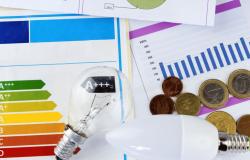Nearly 9 out of 10 French people drink coffee every day.
But it is becoming more and more expensive: Robusta, one of the most used varieties, has seen its price soar in one year.
How can we explain such inflation?
Follow the full coverage
Inflation: prices are soaring
It’s a little pleasure that’s becoming more and more robust, not because of its taste, but rather because of its cost. The coffee bill looks set to become more and more expensive. On the shelves, the price of coffee has increased significantly, 20 cents more on average per pack of ground coffee since January. Proof that we are not really done with inflation.
In a bistro located in Vélizy-Villacoublay, requested in the 8 p.m. report on TF1 to be found at the top of this article, the owner Christopher Rodriguez also saw the price of his package soar. “At the time, 3 years ago, just before the war in Ukraine, we were 18.50 euros per 1 kilo package,” he explains. “Now it is almost 22 euros per kilo.” His espresso thus rose to 1.40 euros and he plans to increase it soon. A step already taken by many cafe owners, a cup costs on average 10 cents more than last January.
How to explain such an increase?
If 2022 inflation was due to soaring energy prices, this time it is climate disruption that is to blame. Harvests have been poor over the past two years in Vietnam and Brazil, the world’s two largest coffee producers. Stocks are therefore at their lowest even though the sector was already in tight flow. “We’ve never seen this,” summarizes Anne Caron, coffee expert in the report at the top of this article. “You have to understand that in the world of coffee, everything that is produced is sold. So as soon as there is a disruption, as soon as something happens, it impacts the price of coffee.”
Drought, heat waves and mealybugs have stunted the growth of Vietnam’s coffee trees, reducing the production of beans used for instant coffee. This country is the world’s leading producer of robusta, a bean used by instant coffee brands, producing on average around 1.8 million tonnes of coffee per year, much of it exported.
Global warming therefore directly threatens the multi-billion dollar coffee industry, with scientists predicting lower yields and fewer areas suitable for growing. Between rising demand and the impact of the climate crisis, the world could face a robusta shortage of up to 35 million bags by 2040.
-
Read also
Why does drinking coffee (in moderation) help you have beautiful skin?
In 2024, the price of coffee will increase by 147% on average. An increase which should increase in the coming months. Brazil has just announced a 20% drop in production. The price of a kilo of coffee should increase by two euros, according to experts.






